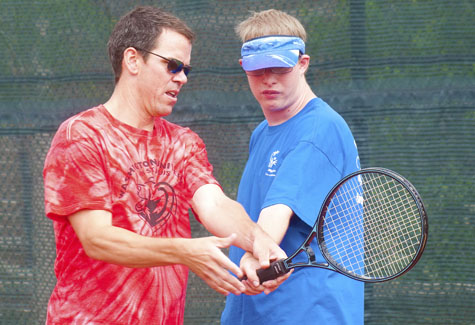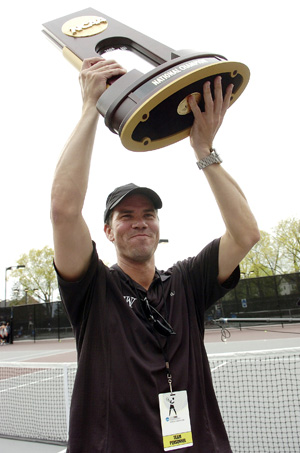
Roger Follmer is throwing rings around a tennis court at the Tao Tennis Center.
It’s an unseasonably warm spring day, and the WUSTL men’s tennis coach is about to put freshman Gary Parizher through a drill designed to develop quickness.
The rings are about 10 inches in diameter. A green ring is placed near the net in each frontcourt, and an orange ring in the center of the backcourt. Parizher is instructed to run back and forth, alternating between the rings at the net and the one in the backcourt, touching each with his racket.
Then Follmer starts hitting lob after lob on each side, forcing Parizher to a different side and ring each time.
Rings are rearranged, and different drills ensue, each one designed to develop a specific nuance or skill on which the player needs to work. Follmer heaps praise when he does the drill correctly, and offers criticism when he doesn’t.
“There it is!” Follmer yells, or “Get behind the ball earlier!” or “If I hit a bad shot, don’t be afraid to drill me!”
It’s this one-on-one time that Follmer knows will pay off down the road — next season or one thereafter.
Follmer, who just finished his ninth season as head coach — one that resulted in an NCAA Division III national singles title for senior John Watts and an NCAA Division III fourth-place overall team finish — continues to collect accolades and honors as he builds WUSTL men’s tennis into a Division III powerhouse.
Among the honors:
- nine consecutive NCAA Division III postseason appearances, including a 2008 national title;
- 26 All-Americans in nine years as a head coach;
- two national coach of the year honors (2006 and 2009); and
- WUSTL’s first University Athletic Association conference title in 2009.
But Follmer would be the first to say it’s not about him; it’s about his players. Players such as Parizher, who asks to be put through 30 minutes of intensive drills on a hot April day; and Watts, who is arguably the best player to wear red and green in WUSTL tennis history.
Follmer says it was gratifying watching Watts’ development as a player.
“He wasn’t a good doubles player when he got here,” Follmer says, “but we worked on his ability to get to the net — which you have to do in doubles — and it helped his singles game.”
In the championship match, Watts defeated in straight sets (6-1, 6-2) Chris Goodwin of Emory University.
“It all came together that last match,” Follmer says. “Watts did everything. He was using a slice. He served well. He took time between serves. He was aggressive at the net. He took risks.”
That match, in many ways, was a microcosm of all that Follmer had been teaching his coaching career.
“If you want to compete for a title, you have to take some risks,” he says. “There are bigger rewards, and, yes, there are chances of failure. But you can’t be afraid.”
Ice man
While growing up in South St. Louis County and attending Lindbergh High School, Follmer never dreamed he’d end up coaching tennis for the university across town. What he really wanted to be, from the time he laced up skates in a peewee hockey league at age 4, was an NHL player.
“I played a lot of sports growing up,” he says, “but my true passion was hockey.”
He says he switched his focus to tennis in high school because, as a 115-pound freshman, “I knew my chances of playing Division I hockey were not good.”
Follmer went to Purdue University on a tennis scholarship and earned a bachelor’s degree in speech pathology in 1996. While earning a master’s degree in special education at Purdue, he became an assistant tennis coach, helping the Boilermakers go from last in the Big Ten conference to an NCAA Division I 38th-overall ranking.
After three years at Purdue, he was hired as assistant coach at the U.S. Naval Academy, another Division I program. It was a pivotal move in his progression to a head coach for two reasons: the kind of athletes Navy attracts, and the experience of coaching them.
“Those Midshipmen are there not only for academics but for military training and tennis,” Follmer says. “Unlike other Division I schools, you have athletes who have other priorities.”

Follmer cites coaches with military academy backgrounds — basketball’s Mike Krzyzewski, Dean Smith and Bobby Knight and football’s Bill Parcells — as role models.
“What those guys learned was to do the most you can with the athletes you have,” Follmer says, “because you don’t have the stud athletes that Michigan or Pepperdine or Stanford have. Their coaching success has a lot to do with coming out of that kind of environment.”
Follmer spent two years as an assistant in Annapolis and helped guide the Midshipmen to two 18-11 seasons and Navy’s first national team ranking. When he heard WUSTL was looking for a head tennis coach, he jumped at the chance to return to his hometown.
“I had opportunities at smaller Division I schools, but I really started looking at D-III athletics,” he says. “The type of athlete here is very similar to Navy, with the exception that we could compete for a national championship at our level.”
He came to WUSTL and has not looked back.
“I feel like I came into a great situation here,” Follmer says. “I’ve had kids who have gone on to Harvard Law, to Cambridge, to MIT. Here, tennis is a bonus.”
It’s a bonus for which each athlete has to work hard.
“Everybody tries out for the team, including Watts,” he says. “I knew he’d make the team, but he went through the same process everyone else did.”
Follmer also instills in his athletes a sense of community involvement. For five years, he and women’s tennis coach Kelly Stahlhuth have put on a tennis clinic for the Special Olympics. This year, it took place May 1 at the Tao Tennis Center.
“It’s a really neat thing,” Follmer says. “My players all participate, and half of them are in tears at the end of it.”
He tells the story of one special Olympian, Robert, who has been coming to the clinic for a few years. Last year, he says, as all the kids and players were gathering for a post-clinic pizza party, Robert got up and gave a speech about what the experience meant to him.
“Then he proceeded to give away all the gold medals he had ever earned to my team,” Follmer says. “He was thanking us!”
Balancing act
Stahlhuth says Follmer is successful because he knows coaching a Division III elite athlete is a balancing act.
“Academically, athletically, emotionally, spiritually — it’s all a part of it, and Coach Follmer succeeds at that,” Stahlhuth says.
“He knows how to work with each style of personality and gets the maximum out of each athlete,” she says. “They might think they have reached their plateau, but he gets even more out of them.”
He does so because the drills each player needs to work on come intuitively to Follmer.
Early in the championship season of 2008, Follmer recalls doing extensive work with then-sophomore Danny Levy on being aggressive and coming to the net.
“We worked a lot on that,” Follmer says. “I called it ‘Getting to the Party.’ Get to the party! Finish at the party!”
That drill paid off in ways unimaginable, because on May 15, 2008, the Bears were playing Emory with the national title on the line. WUSTL held a 4-3 lead in the championship match, and the title hinged on the No. 3 singles matchup, Levy vs. Emory’s David Caplan.
Levy lost the first set but battled back to win the second. In the final set, Levy held a slim lead at 5-4 when Follmer had a talk with the young man.
“I told him, ‘He’s giving you all these short balls. Get to the net. You’ve worked on your volleys, trust them.’ ”
Levy took his coach’s advice and became more aggressive, throwing Caplan off his game and playing himself into position to win the match.
“At the first match point,” Follmer says, “he takes the first short ball Caplan hits and charges to the net. He’s right up there and hits the volley for the winner.
“And that was it.”
Amid the championship celebration, Follmer says team member Corey Yealy said, “Did you see that, coach? Danny got to the party!”
Yes, Follmer replied.
“And we won a championship because of it.”
This season didn’t end in a team championship, but Follmer was satisfied with the results.
“You can’t control winning and losing, but you can control the effort and your commitment to the program and the university athletic department,” he says. “So I pride myself on that. I have a lot of kids that stick it out even if they’re not starters because they’ve enjoyed the exercise and the camaraderie.
“We’re all working toward one goal, and if it doesn’t work out, at least we’re doing it the right way.”
Fast facts about Roger Follmer
Years at WUSTL: Nine (155-50 overall, .756 winning percentage)
Family: Single
Other tennis achievements: Head coach of the World TeamTennis St. Louis Aces, 2009, coaching professional players Kim Clijsters, Anna Kournikova, Liga Dekmeijere, Tripp Phillips, Sam Querrey and Ashley Weinhold
On his bookshelf: The Blind Side: Evolution of a Game by Michael Lewis; Open: An Autobiography by Andre Agassi; and anything written by the late John Wooden
What he’s doing this summer: “I’ve got camps in June. … In July, Coach Kelly and I run an ITA summer circuit tournament. Then I’m getting away to Florida for a recruiting tournament. I’m hoping to have some time to myself at the end of July. Maybe find a beach somewhere.”